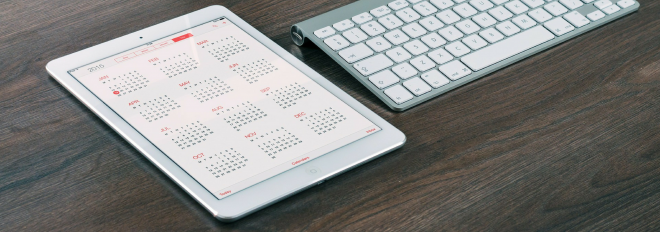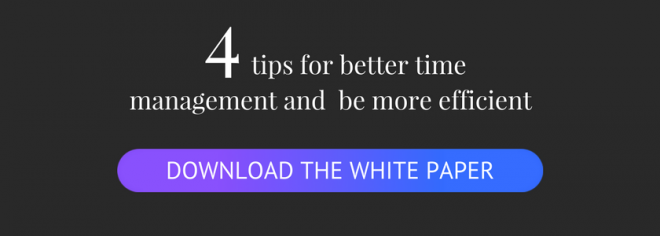With the rise of new technology, the way we work has totally changed: We now have access to all our key documents and applications online, we can skype with our colleagues across the ocean and easily work from home. Our online interactions have increased and made us more efficient. But at the same time, it has become more and more difficult to disconnect and feel overwhelmed by the constant notifications.
Sound familiar?

1. To manage your time well, you have to find your rhythm.
Being productive doesn’t mean working from 7AM to 10PM, and just take 15minutes break at lunch to eat a sandwich, in front of a laptop of course. Indeed, a study released few years ago by Desk Time, showed that the ideal rhythm for work is 52/17: 52 minutes of work, 100% focused, and 17 minutes to relax.
If this pace doesn’t suit you, don’t worry! There are a multitude of methods to better manage your time, you just have to find the one that suits you best!
I don’t think there’s a magic formula for organizing your time: everyone works their own way. Some people like to wake up very early to do their “morning routine,” others stay up late and find they are more productive after midnight! What matters is what works best for you. No need to duplicate the lifestyle of Steve Jobs & Co if it doesn’t suit you. And don’t worry, choosing your own method doesn’t mean you won’t still create the next Apple!
For further information about time management methods and techniques:
- Eisenhower Matrix defines priorities
- Pomodoro Technique
- Journaling : Bullet Journal and M3 journal
- Procrastination: Harmful or necessary?
- Multitasking: Friend or foe to productivity?
2. Tools for time management
No matter the pace and method you choose, one thing is for sure, we are not Julie. We’re not robots. We can’t stay focused too long and that’s why breaks are important. We tend to think of ourselves as superheroes and overload our days and agendas, juggling tasks and meetings without taking breaks.
Fortunately for us, with the rise of digital, there are a number of tools that can help us better manage our time: avoid distractions, automate tasks, take breaks or better plan appointments!
3. Manage your appointments well to gain in productivity
Business professionals spend an average of 24 days a year in meetings (Wisembly Barometer / IFOP 2016)! That’s a lot of time! The problem with meetings is that if they are not planned effectively, they break up the day and directly impact our efficiency.
When you configure Julie Desk, we ask about your habits and how you prefer to organize your meetings:
- How many appointments do you have per week?
- How much time do you want between appointments?
- When do you want to have meetings?
- What means of transport do you use, etc.?
- …
When I registered for Julie Desk, I had some trouble answering these questions. I had never really asked myself how I wanted to organize my meetings and I tended to schedule them at any time I was available. But I should have thought it over.
At first, I told Julie she could schedule meetings from 8:30 to 7:30! And that’s what she did! But I soon realized that I didn’t like to have meetings early in the morning or at the end of the day because I prefer to use that time to work on emails or manage my tasks.
Julie let me to define how I wanted to organize my agenda. Working with Julie and delegating the organization of my appointments to her helped me define when I wanted to have meetings and when I didn’t want to be disturbed so I could move forward on different tasks. And if I find those preferences no longer suit me, I can still adjust my them via my dashboard.
I also asked Julie to reserve slots in my calendar for personal activities. I already had a tendency to do it (or at least try to do it). I’d set timeslots for the gym or seeing friends. But you can easily find excuses to cancel these types of activities. When a last-minute meeting comes up, you cancel the gym. Back when I was managing my entire schedule, I used to postpone or cancel most of my personal activities because they weren’t really “scheduled.” That resulted in frustration and low productivity. When you ask Julie to manage your schedule, she takes those personal timeslots into account. If she sees that you have something planned at a given time, she will try to find another time slot to plan your meeting. Working in this way, I realized that most of the time, meetings or events that were scheduled at the last minute could be reorganized without any problem. No more excuses not to go to the gym (other than happy hour of course)!
To go further:

